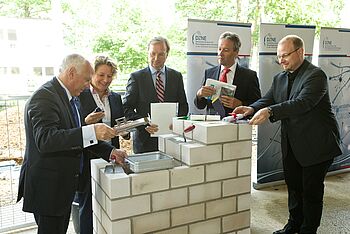Bonn, September 4th, 2014. One of the largest and most advanced research buildings in North Rhine-Westphalia is currently being erected in Bonn. It comprises approximately 16,000 square meters of usable area. Today the symbolic foundation stone has been laid to mark the site that will host some of the most advanced translational research on neurodegeneration worldwide.
Symbolic corner stone was laid by the DZNE: National Health Research in Bonn
Achieving more together
About 500 people will work here from 2016. They will investigate diseases of the nervous system, such as Alzheimer’s, Parkinson’s and Chorea Huntington, to develop new strategies for prevention, treatment and care. The state of NRW and the federal government both share the construction costs of about 110 million euros – approximately one-quarter is funded by the federal government and three-quarters by NRW. It is an investment in the research of the DZNE that was founded in 2009 and has become an international established research institution in a very short time.
The working groups of the DZNE, currently spread over various real estates, are brought together. This concludes a very successful start-up phase. Fundamental, clinical and population-based research at DZNE will now be located under one roof. Furthermore the close integration with the Clinics of Neurology, Psychiatry and Palliative Medicine (NPP) will strengthen the translational research at the DZNE.
"Due to the new building but especially due to the good reputation of the DZNE Bonn is becoming even more attractive for scientists from home and abroad. Bonn wants to become as renown for dementia research as Heidelberg is for cancer research", commented Jürgen Nimptsch, mayor of the City of Bonn.
"The DZNE in Bonn covers research on the whole translational spectrum. Embedding the DZNE building within the clinical campus of the University of Bonn will enable close contacts between fundamental, clinical and psychiatric sciences and further tighten the excellent collaboration between DZNE and UKB", according to Professor Pierluigi Nicotera, Chairman of the Executive Board of the DZNE.
The first impression is determined by transparency and color
The architecture of the building will be stunning. Planned by wulf architekten, a renowned architectural office from Stuttgart, the three distinctive corpuses form a coherent ensemble with generously combined free areas. They are connected by short cuts and niches for communication. All areas are within short walking distance for staff and study participants. The colors of the sunshades blinds of the outer facade reflect the colors of the nearby forest in the cycle of seasons. Depending on the season different parts of the building will stand out in color. At the same time the curved building complex with its lamellar glass facade integrates seamlessly into the forest.
"Neurodegenerative diseases such as Dementia or Parkinson are a major challenge for society. We can master it successfully, if university and non-university research organizations work together closely. Therefore we are pleased that we can strengthen national health research in Germany and in the region by constructing a complex of new research buildings on a common campus", said Svenja Schulze, Minister of Science of NRW at the corner-stone ceremony of the new building for DZNE. "The excellent research conditions at the DZNE will give dementia research a further boost and will help to alleviate or cure age-related ailments. Successful research is designed and supported by motivated staff. The new building in Bonn creates the best conditions to achieve the research objective: to enable affected people to live a healthier and more independent life", remarked Thomas Rachel, the Parliamentary State Secretary to the Federal Minister of Education and Research.

